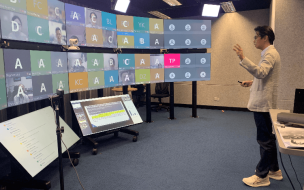When it started, he was working as an engineer on an oilrig for oilfield services company Schlumberger, and had been for around three years. The lifestyle on the rig was hard—out in the middle of the forest, hours away from the nearest city, in the freezing cold, and with little to do besides work.
It was monotonous, and Taylor knew that he wanted to pivot his career into something more exciting.
“I wanted to go somewhere warm, with lots of people, somewhere different,” he recalls.
Now, almost five years since leaving the rig, Taylor has certainly achieved his goal: he has landed the so-called ‘triple-jump’, changing industry, location, and job function to work as a senior manager of investments at Dah Sing Financial Holdings in Hong Kong.
It’s a far cry from the frosty forests of his engineering career, but it was exactly the move he was looking for, and he credits the success of the move to his time on the MBA at HKUST Business School.
“I met people I otherwise wouldn’t have met”
One of the key things that Taylor had been looking for from an MBA was help in switching geographic locations. As a Canadian, North America was too close to home, and as Taylor’s father is Irish, he felt that he could visit Europe whenever he needed.
“Asia is dynamic and exciting,” he says. “And as I’d heard of HKUST before, I thought Hong Kong was a good place to start.”
Going from Canadian forest to urban jungle was something of an adjustment, but Taylor says that the course and the cohort at HKUST Business School helped to smooth the transition.
“I was very pleased with it,” he recalls. “The cohort that we had was very international, and I also felt that they developed quite a good bond pretty quickly—I met a lot of people I otherwise wouldn’t have met.”
Indeed, 98% of the 2018 class at HKUST was of non-local nationality, with many of the students coming from Asian backgrounds.
As an ex-pat in a business climate that relies heavily on networking for advancement, this networking factor to the MBA was crucial to Taylor’s career development. For one thing, when he first moved to Hong Kong he spoke no Chinese; he is now intermediate level.
But particularly when it came to changing his industry, the content of the course was invaluable too.
“The courses helped me do what I needed to do to switch my career”
For students like Taylor, who know the industry that they want to go into, the MBA offers six career tracks: Finance, Consulting, Business Technology and Analytics, General Management, Marketing, and Entrepreneurship.
Taylor’s route of choice was finance—and it didn’t disappoint.
“The courses were good, and they helped me do what I needed to do to switch my career,” he says.
The curriculum offers electives in both private equity and investment banking, both essential topics in Taylor’s current line of work. They cover everything from investment analysis to negotiations, and gave Taylor the opportunity to turn his existing skills to a new purpose.
“What I was doing before was installing, monitoring, and making decisions based on equipment—I was getting data the entire time and making decisions based on that,” Taylor says.
“Now I’m doing a similar thing, but the data is about financial markets on a pan-Asia scale. I’m using that data to interpret a whole bunch of different things to decide whether to invest—that analytical ability was actually really transferable.”
“You hit the ground running right away”
Taylor got an internship at an asset management company after the MBA and worked with them for two years before switching into his current role as an investment analyst, and he thinks that the crash course he got at HKUST Business School was hugely valuable to his success.
“The way I like to think of it is that it was an opportunity to have a trial run for a year and a half where I was effectively living the new role,” he muses.
“You feel like you’re in the industry effectively—you know the lingo, you know the jargon, so when it comes time to start interviews and start working, it’s not so dramatic of a transition.
“You hit the ground running right away—when I started, I didn’t feel like a trainee or a new grad, I felt like part of the team.”
When asked if he would recommend his experience at HKUST Business School to other prospective MBAs looking to land the triple-jump like he did, his answer is unequivocal: definitely.
“I had a general idea of what I wanted and as I went into the program I narrowed it down,” he says. “I got a job that I really liked, so it’s definitely a good way to do it—especially if you want to change geography.”
Student Reviews
HKUST Business School








